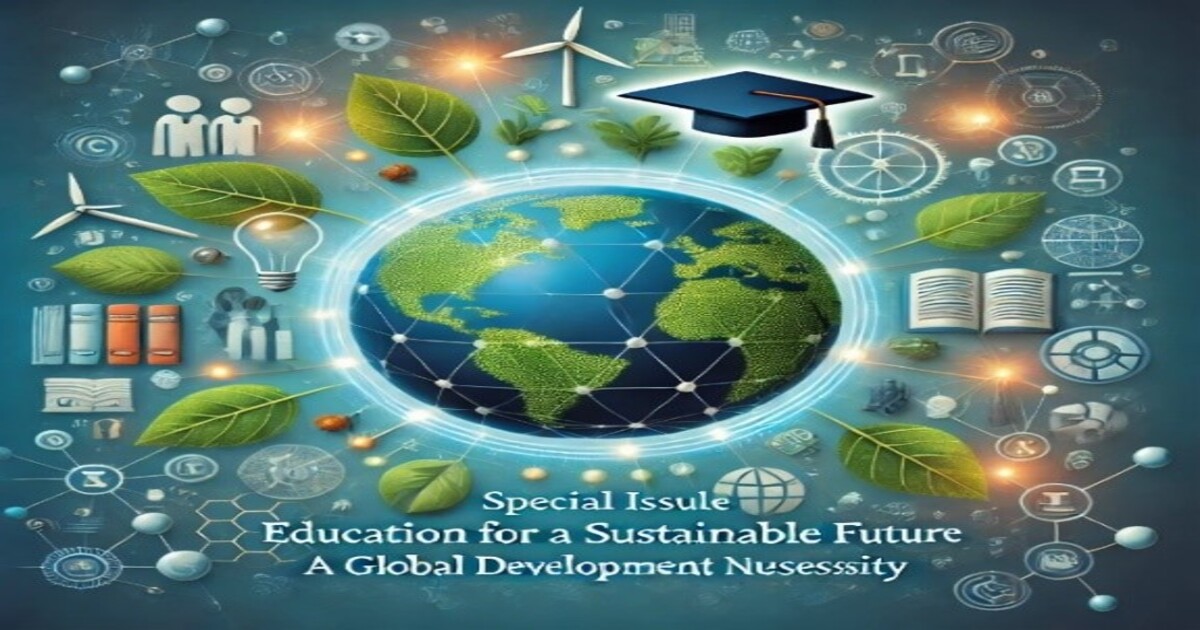Education for a Sustainable Future: A Global Development Necessity
A special issue of Sustainability (ISSN 2071-1050). This special issue belongs to the section "Sustainable Education and Approaches".
Deadline for manuscript submissions: 31 May 2026 | Viewed by 1272

Special Issue Editors
Interests: education; tourism ; circular economy; statistics; structural equation modeling; social science
Interests: e-learning; data science; educational data mining; educational technology; engineering education; energy engineering; energy generation; renewable energy; energy efficiency
Special Issues, Collections and Topics in MDPI journals
Interests: NLP ; computational linguistics; artificial intelligence; digital communication; digital analytics
Special Issue Information
Dear Colleagues,
This Special Issue seeks to explore innovative approaches and frameworks that advance sustainability through education. Its focus aligns with the global imperatives outlined in the UN’s Sustainable Development Goals, particularly SDG 4 (Quality Education) and SDG 17 (Partnerships for the Goals).
This Special Issue will delve into the following areas:
- Focus: Investigating educational policies, strategies, and systems that support sustainable development at local and global levels.
- Scope: Contributions may address sustainability curricula, teacher training, e-learning platforms, and their impact on shaping sustainable behaviors.
- Purpose: To provide insights and actionable strategies for integrating sustainability into educational practices and fostering intergenerational responsibility.
By bridging gaps in the existing literature, this Special Issue contributes to the discourse on sustainability tools, assessment models, and their application in education. It invites interdisciplinary research from socio-economic, scientific, and policy perspectives to redefine education's role in achieving sustainability.
- Goals of the Special Issue
- Provide a comprehensive analysis of educational innovations oriented toward sustainability.
- Examine how educational policies can foster the implementation of the SDGs, both locally and globally.
- Identify and analyze effective educational practices that integrate sustainability at various educational levels.
- Contribute to the development of theoretical frameworks and practical tools to measure the impact of these policies and practices.
- Conceptualization of Key Constructs
This Special Issue focuses on the concept of "Education for a Sustainable Future," encompassing the following key constructs:
- Educational Innovation: The integration of active methodologies and technologies into teaching and learning processes to enhance awareness and action toward sustainable development.
- Educational Policies: Regulatory frameworks and institutional strategies that support the advancement of the Sustainable Development Goals (SDGs).
- Sustainable Educational Practices: Pedagogical approaches and curricular activities designed to promote sustainable values and competencies.
- Empirical Evidence and Justification
Recent studies highlight how education influences sustainable behaviors. Examples include the growing incorporation of circular economy principles into curricula and the effectiveness of e-learning platforms in facilitating intergenerational learning.
- Added Value
This Special Issue stands out by achieving the following:
- Offering an interdisciplinary approach, integrating socioeconomic, policy, and pedagogical perspectives.
- Providing evaluation models and practical tools for implementing sustainability in education.
- Creating a collaborative space for researchers and educators worldwide.
- Expected Impact
- Theoretical: Expand the knowledge base on education for sustainability, addressing current gaps in the literature.
- Practical: Provide strategies and practical examples for integrating sustainability into education, with applications in educational policies and curriculum development.
- Types of Articles Anticipated
- Empirical Research: Qualitative and quantitative studies on the implementation of sustainable educational strategies.
- Systematic Reviews: Critical analyses of the relevant literature.
- Theoretical Articles: Conceptual proposals that develop innovative frameworks for sustainability in education.
- Case Studies: Practical examples of successful educational policies and practices.
- Innovative Methodologies: New approaches for measuring the impact of sustainability in education.
- Manuscript Characteristics
- Clear and replicable methodologies.
- Relevance to at least one of the key constructs.
- Discussions oriented toward practical applications or policy implications.
Dr. Mónica Martínez-Gómez
Dr. César Berna-Escriche
Dr. Víctor Yeste
Dr. Mª Ángeles Alcaide González
Guest Editors
Manuscript Submission Information
Manuscripts should be submitted online at www.mdpi.com by registering and logging in to this website. Once you are registered, click here to go to the submission form. Manuscripts can be submitted until the deadline. All submissions that pass pre-check are peer-reviewed. Accepted papers will be published continuously in the journal (as soon as accepted) and will be listed together on the special issue website. Research articles, review articles as well as short communications are invited. For planned papers, a title and short abstract (about 250 words) can be sent to the Editorial Office for assessment.
Submitted manuscripts should not have been published previously, nor be under consideration for publication elsewhere (except conference proceedings papers). All manuscripts are thoroughly refereed through a single-blind peer-review process. A guide for authors and other relevant information for submission of manuscripts is available on the Instructions for Authors page. Sustainability is an international peer-reviewed open access semimonthly journal published by MDPI.
Please visit the Instructions for Authors page before submitting a manuscript. The Article Processing Charge (APC) for publication in this open access journal is 2400 CHF (Swiss Francs). Submitted papers should be well formatted and use good English. Authors may use MDPI's English editing service prior to publication or during author revisions.
Keywords
- sustainable education
- circular economy in learning
- pedagogical innovations
- Sustainable Development Goals integration into education
- policy and practice in sustainability
- teacher training and sustainability
- e-learning for global goals
- environmental education
- higher education and Sustainable Development Goals
- intergenerational learning
Benefits of Publishing in a Special Issue
- Ease of navigation: Grouping papers by topic helps scholars navigate broad scope journals more efficiently.
- Greater discoverability: Special Issues support the reach and impact of scientific research. Articles in Special Issues are more discoverable and cited more frequently.
- Expansion of research network: Special Issues facilitate connections among authors, fostering scientific collaborations.
- External promotion: Articles in Special Issues are often promoted through the journal's social media, increasing their visibility.
- Reprint: MDPI Books provides the opportunity to republish successful Special Issues in book format, both online and in print.
Further information on MDPI's Special Issue policies can be found here.







